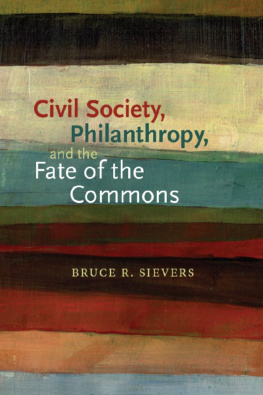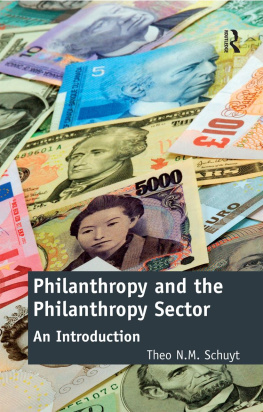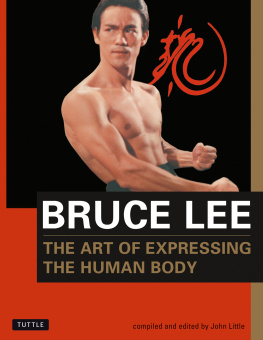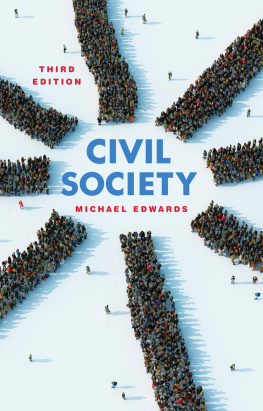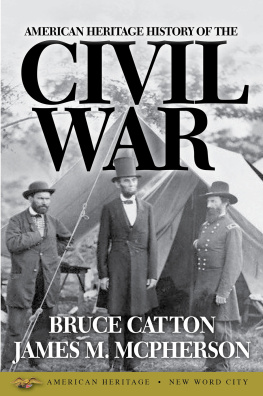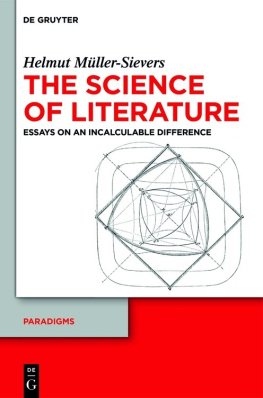CIVIL SOCIETY:
Historical and Contemporary Perspectives
Series Editors:
Virginia Hodgkinson: Public Policy Institute, Georgetown University
Kent E. Portney: Department of Political Science, Tufts University
John C. Schneider: Department of History, Tufts University
For a complete list of books that are available in the series, visit www.upne.com
Bruce R. Sievers, Civil Society,
Philanthropy, and the Fate of the Commons
Janelle A. Kerlin, ed., Social Enterprise:
A Global Comparison
Carl Milofsky, Smallville:
Institutionalizing Community in Twenty-First-Century America
Dan Pallotta, Uncharitable:
How Restraints on Nonprofits Undermine Their Potential
Susan A. Ostrander and Kent E. Portney, eds.,
Acting Civically: From Urban Neighborhoods to Higher Education
Peter Levine, The Future of Democracy:
Developing the Next Generation of American Citizens
Jason A. Scorza, Strong Liberalism:
Habits of Mind for Democratic Citizenship
Elayne Clift, ed.,
Women, Philanthropy, and Social Change: Visions for a Just Society
Brian OConnell, Fifty Years in Public Causes:
Stories from a Road Less Traveled
Pablo Eisenberg,
Challenges for Nonprofits and Philanthropy: The Courage to Change
Thomas A. Lyson,
Civic Agriculture: Reconnecting Farm, Food, and Community
Virginia A. Hodgkinson and Michael W. Foley, eds.,
The Civil Society Reader
Henry Milner, Civic Literacy:
How Informed Citizens Make Democracy Work
Ken Thomson,
From Neighborhood to Nation: The Democratic Foundations of Civil Society
Bob Edwards, Michael W. Foley, and Mario Diani, eds.,
Beyond Tocqueville: Civil Society and the Social Capital Debate in Comparative Perspective
Phillip H. Round,
By Nature and by Custom Cursed: Transatlantic Civil Discourse and New England Cultural Production, 16201660
Brian OConnell,
Civil Society: The Underpinnings of American Democracy
Civil Society,
Philanthropy,
and the
Fate of the Commons
Bruce R. Sievers
TUFTS UNIVERSITY PRESS
Medford, Massachusetts
Published by University Press of New England
Hanover and London
TUFTS UNIVERSITY PRESS
Published by University Press of New England
One Court Street, Lebanon NH 03766
www.upne.com
2010 by Trustees of Tufts College
All rights reserved
Manufactured in the United States of America
Designed by Doug Tifft
Typeset in Minion Pro and Scala Sans by Michelle Grald
For permission to reproduce any of the material in this book, contact Permissions, University Press of New England, One Court Street, Lebanon NH 03766; or visit www.upne.com
Library of Congress Cataloging-in-Publication Data Sievers, Bruce R.
Civil society, philanthropy, and the fate of the commons / Bruce R. Sievers.
p. cm.(Civil society, historical and contemporary perspectives)
Includes bibliographical references and index.
ISBN 9781-58465851-1 (cloth: alk. paper)
ISBN 9781-58465914-3 (pbk.: alk. paper)
1. Civil society. 2. Civil societyHistory. 3. Common good.
4. Social service. I. Title.
JC337.S555 2010
300dc22 2009045127
To the memory of my parents
DOROTHY AND ED SIEVERS,
humanistic engineers
Preface
O ne advantage of taking a long time to complete a book is that it allows incorporation of new research and information on events that occur along the way. That has certainly been the case with this project. It began in the form of a monograph, Can Philanthropy Solve the Problems of Civil Society? published in 1995 in an Occasional Papers series of the Indiana University Center on Philanthropy. At the time, a colleague optimistically suggested that the essay might be easily turned into a short book. That was nearly fifteen years ago.
The original question remains at the heart of this book, but the route to answering it has taken many twists and turns. The question presumes a single understanding of civil society, but, of course, there is not one but many. So the first task was to arrive at a defensible concept of civil society out of the great body of literature on the subject. This in turn led to the development of the idea of seven constitutive elements, and consequently, the need to follow the seven threads into their particular traditions in the history of ideas. The second task was to trace the time and place at which these seven became fused into the first coherent manifestation of the civil society idea. Somewhat surprisingly, the course of my research increasingly led to an unlikely candidate for the title of the first civil society: the golden age of the Dutch republic in the seventeenth century. The evidence for this conclusion is compelling, and I present this argument in chapter 4.
At the same time, it became apparent that the evolution of civil society was intimately related to the development of liberal democracy and its efforts to deal with problems of the commons. Thus, the concluding chapters of the book take up the historical legacy of the development of civil society and the need for philanthropic attention to its contemporary deficiencies, particularly in light of the pressing need to address the contemporary problem of the commons. The writing emerges from a perspective of political theory and the history of ideas, reflecting the roots of my own intellectual orientation, but also from a career informed by more than thirty years spent working professionally in philanthropy.
Over the decade and a half during which this book evolved, much has taken place that has shaped both the worlds of practice and of scholarship on civil society and philanthropy. A huge wave of new nonprofits and foundations have joined the ranks of civil society in the late 1990s and early 2000s, followed by an era of great belt-tightening in the latter part of the first decade of the twenty-first century. Among the new foundations appeared the largest in history, the Bill and Melinda Gates Foundation. Around the world, the visible presence of civil society has grown dramatically, to the point that civil society is now considered an essential player, along with government and business, in addressing national and international problems. Scholarship on civil society, philanthropy, and the nonprofit sector has proliferated in a stream of new articles, books, and journals on important but previously little-studied aspects of the field and in the creation of important new centers of research on civil society and philanthropy (for one of which, the Stanford Center on Philanthropy and Civil Society, I serve as an adviser). While attempting to keep up with this expanding universe of civil society activity has been a challenge, this book has benefited greatly from the taking into account of recent events and scholarship.
Another advantage of an extended writing process is the ability to gain valuable insights and critical feedback from friends in the field. The advice on both substance and style offered by many colleagues and critics over the past decade has been enormously helpful. Of course, I take full responsibility for the final product and its deficiencies, but the work has been improved greatly by the thoughtful commentary of both scholars and practitioners who have been willing to take the time to read portions of the manuscript. I am particularly grateful for the commentary and support from my colleagues at the PACS Center, Rob Reich, Woody Powell, and Deb Meyerson; James Allen Smith at The Rockefeller Archive Center; Bob Payton and Les Lenkowsky at the Indiana University Center on Philanthropy; David Mathews and John Dedrick at the Kettering Foundation; Deborah Rhode at the Stanford Center for the Legal Profession; Bill Schambra at the Bradley Center for Philanthropy and Civic Renewal; Perla Ni and Eric Nee at the Stanford Social Innovation Review; Michael ONeill at the University of San Francisco; Ginny Esposito at the National Center for Family Philanthropy; Doug Bauer at Rockefeller Philanthropy Advisors; Peter Shiras at Independent Sector; and David Myers at the UCLA Center for Jewish Studies.

